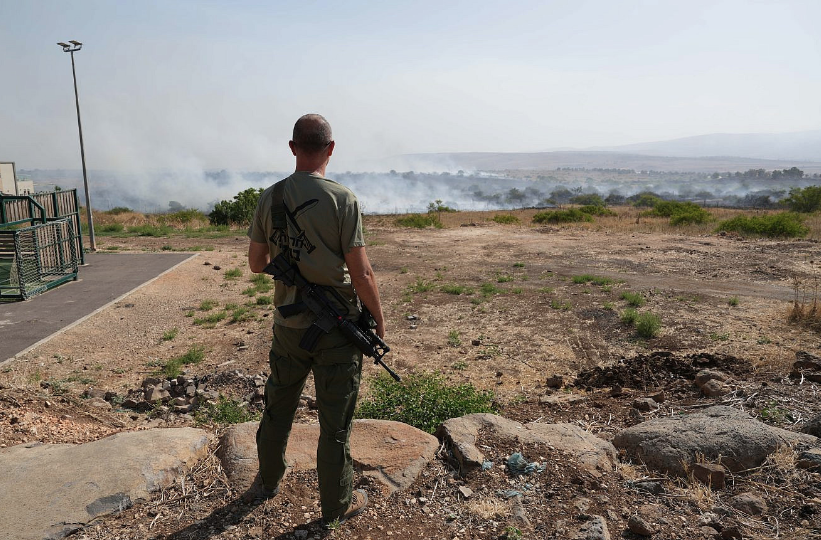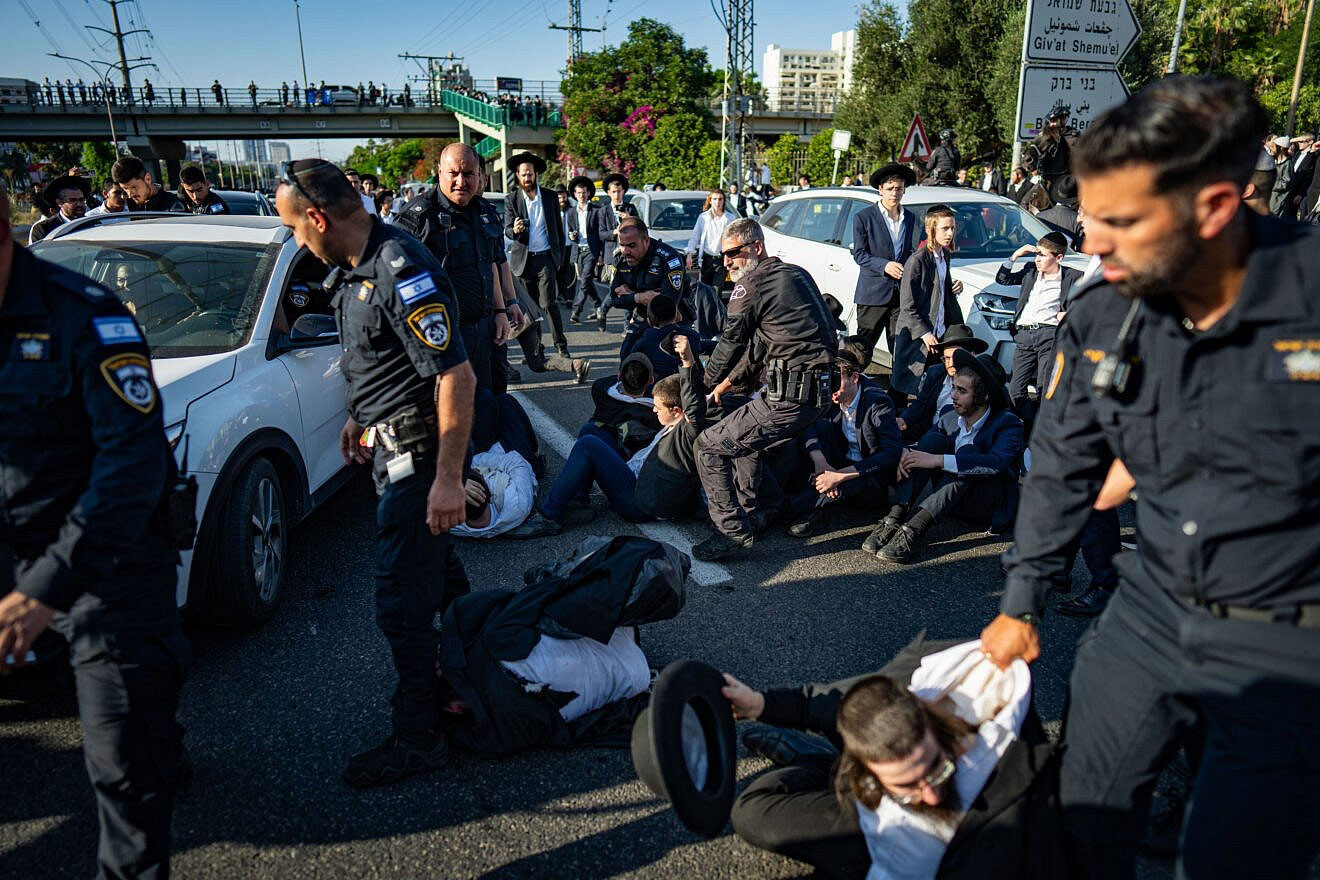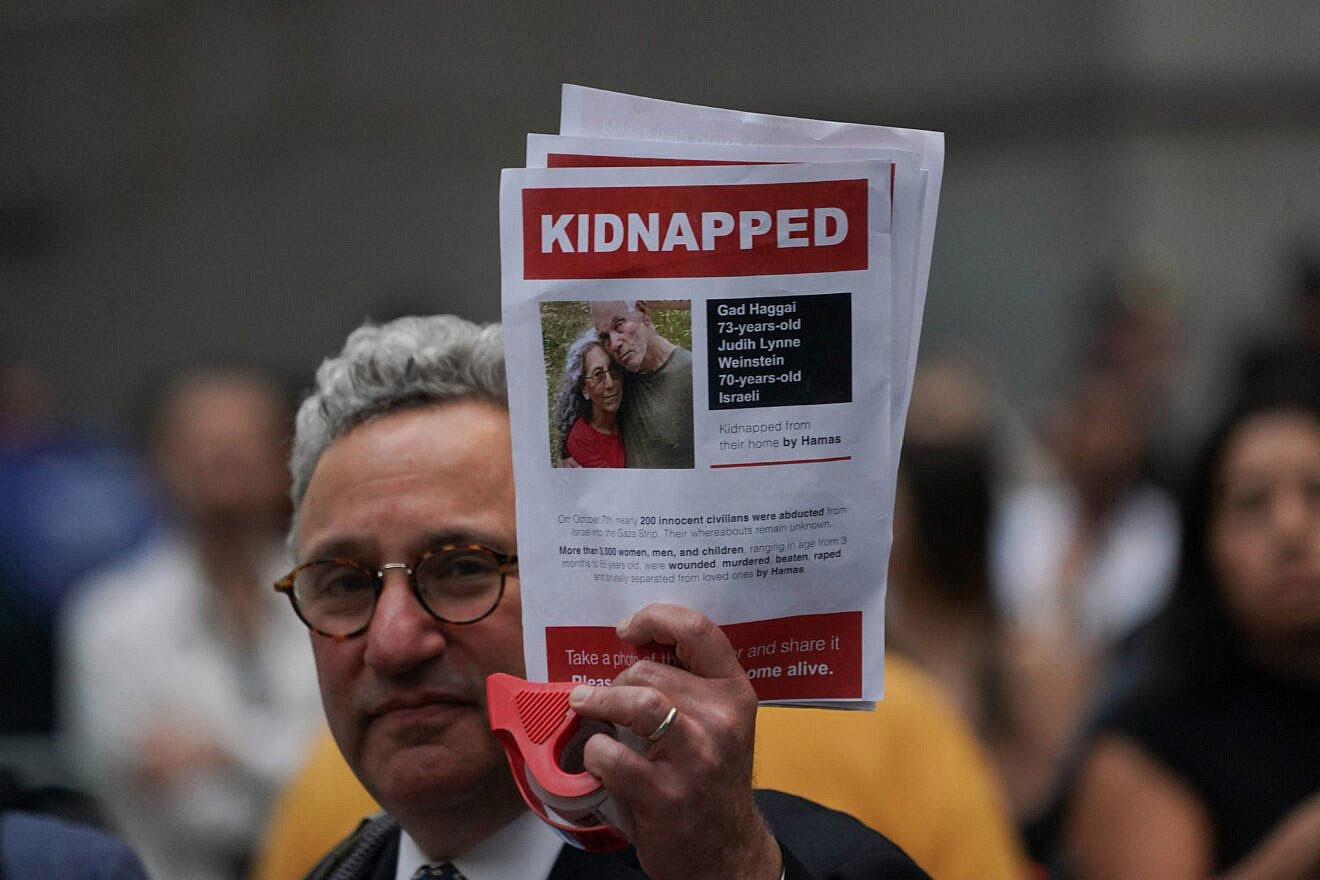Courtesy of JNS. Photo credit: Ayal Margolin/Flash90
A large fire sparked by missiles launched from Lebanon, in the northern Israeli city of Katzrin, June 13, 2024
(JNS) — The Hezbollah terrorist group in Lebanon significantly decreased its attacks on Israel this week, Israel Defense Forces data showed Tuesday, as U.S. presidential envoy Amos Hochstein arrived in the region in an attempt to prevent all-out war on the Jewish state’s northern border.
Just after noon on Tuesday, sirens sounded in the Western Galilee due to a potential “hostile aircraft intrusion” from Lebanon, with Hezbollah claiming it launched a drone attack on an Israeli military position.
The IDF announced it launched interceptor missiles at the three “suspicious aerial targets” that crossed into Israeli airspace, successfully intercepting the threats. Alarms sounded due to fears of falling shrapnel.
Later on Tuesday afternoon, rocket alarms were reported in the towns of Shlomi, Matzuva, Ya’ara, Neve Ziv and Manot, all in the Western Galilee.
Until Tuesday’s attacks, the most recent Home Front Command alert for rocket and missile fire on the northern border was activated at 3:21 a.m. on Sunday in the area of Mitzpe Hila in the Upper Galilee, while drone-alert sirens had last sounded in the north some three hours earlier.
Though a “suspicious aerial target” crossed from Lebanese territory into the maritime space near Acre on Israel’s northern coast on Monday, it was shot down by air-defense fighters, and no alerts were triggered.
Meanwhile, Hezbollah did not take responsibility for any attacks on Israel on Monday, a review of Lebanese media showed.
Hochstein, who also serves as a senior adviser for energy and investment to the president, met with Israeli Prime Minister Benjamin Netanyahu shortly after touching down in Tel Aviv on Monday.
The White House official told the premier that de-escalation is possible, but that there is no “magic solution” to the situation, which he said was largely dependent on what happens with Hamas in the Gaza Strip.
Hezbollah has refused to negotiate a possible truce with the Jewish state until a full ceasefire is implemented in the Palestinian coastal enclave.
The White House official rejected Jerusalem’s demand that a diplomatic deal to end the conflict in the north be based on the implementation of U.N. Security Resolution 1701 — which was adopted to end the Second Lebanon War in 2006 and calls for a demilitarized zone from the Blue Line to the Litani River some 18 miles to the north.
Instead, he said it should include a range of options, including moving Hezbollah six miles from the border. He stressed that the United States was concerned about further escalation and called for calm on both sides.
Hochstein traveled to Beirut on Tuesday, including for talks with Parliament Speaker Nabih Berri, a powerful ally of Hezbollah.
“The conflict along the Blue Line [the de facto border] between Israel and Hezbollah has gone on for long enough,” Hochstein said after the meeting with Berri. “Innocent people are dying, property is damaged, families are shattered and the Lebanese economy continues to decline.
“The country is suffering for no good reason. It’s in everyone’s interest to resolve it quickly and diplomatically,” added the American envoy.
Iran-backed Hezbollah has attacked northern Israel nearly every day since joining the war in support of Hamas on Oct. 8, killing more than 20 people and causing widespread damage. Tens of thousands of Israeli civilians remain internally displaced due to the ongoing violence.
Hezbollah ramped up its attacks last week. On Thursday, it claimed to have launched some 150 rockets and 30 drones in its “largest and most comprehensive attack” since the start of the war. Two people sustained light wounds in the attacks, which also caused widespread destruction.
The day prior, as Israeli families celebrated the festival of Shavuot (the “Feast of Weeks”), Hezbollah had launched more than 200 rockets across the border in one of the heaviest attacks in recent months.
The intensifying aggression is driving the Middle East towards a wider escalation that could have catastrophic consequences for Lebanon and the region, IDF Spokesman Brig. Gen. Daniel Hagari warned on Sunday.
“Hezbollah is jeopardizing the future of Lebanon so that it can be a shield for Hamas,” he said in remarks to the foreign press. “The one that murdered the elderly, raped women, burned children and kidnapped Jews, Muslims and Christians during their massacre on October 7th.”
On Monday night, the Israeli Air Force announced that it had successfully eliminated a senior Hezbollah terrorist in an airstrike in the Selaa area of Southern Lebanon. Muhammad Mustafa Ayoub was said to be a “key operative” responsible for rocket and missile launches toward Israel.
The military said the targeted killing was “part of the IDF and security forces’ activity to impede Hezbollah’s military build-up in terms of weaponry and its stockpiling of weapons designated for terror use.”
Since Oct. 8, Hezbollah has fired more than 5,000 rockets, anti-tank missiles and explosive UAVs from Lebanon at Israeli border communities.





